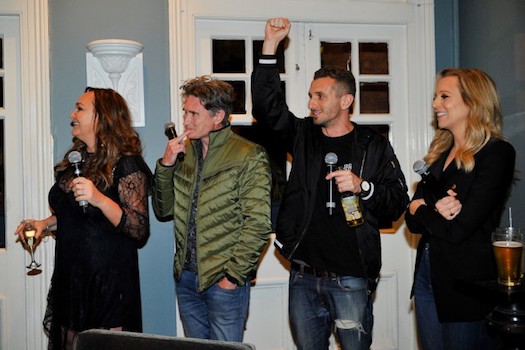Comment from Peter Saxon
Radio is a creative endeavour that requires the collaboration of disparate personalities.
Collaboration requires meetings and lots of them. Much like family gatherings, meetings are God’s way of teaching us to get along with people we don’t necessarily like.
Meetings can be like a pressure cooker in which the juiciest ideas rise to the top to be plated up and devoured by an audience which has an insatiable appetite for fresh content. Or meetings can be more like an open fire place, full of flame and fury but, ultimately, an inefficient way of generating heat as most of it disappears up the chimney.
At a recent client function for the HIT Network’s Drive shows, early Drive and TEN’s The Project co-host Carrie Bickmore confided to radioinfo that she was not a fan of meetings. “Meetings go on a lot longer than they need to,” she says. “I don’t think I’ve ever been in a meeting where I thought, that went shorter than it should’ve.
“I think that half the time, we spend a lot of time saying a lot of excess things. We’d all do better if we all went, ‘Here’s what I’m here to say. Sorted mate. All right, out we go.’”
Dave Hughes of Hughesy & Kate doesn’t mince words: “I hate meetings! I hate when someone stands next to a whiteboard with a pen in their hand.”
Hughesy reckons whiteboards kill creativity. “We’ve got someone standing next to a whiteboard with a pen in their hand every day. And every day I want say to him, just the fact that you’re standing there with a pen in your hand, expecting genius to flow… like trying to force it out, kills it for me.”
The language of meetings, the throw away lines we use, can sound benign but are often weaponised in a kind of cold war between participants.
My biggest bugbear is when people start a sentence with “To be honest…” To me it suggests that everything they’ve said til then has been bullshit. The thought hadn’t entered my mind that the person I was talking to was anything but honest so why cast doubt on my innocent assumption by bringing it up?
If they add the word “completely” or “totally” as in, “To be TOTALLY honest…” not only does it “totally” convince me that everything they’ve said has been “complete” bullshit but that what they’re about to tell me is going to be less than the rare statement of actual truth they’re trying so hard to ‘totally” convince me it will be.
The variant phrase, “In all honesty…” is dependant on the defining quantity of “all” which could be little or none as in: “For all the honesty that comes out of parliament…” which, most will agree, doesn’t amount to much.
Shonky businesses stopped using the word Honest as in ‘Honest John’s Autos’ in the 20th century when they realised it was counterproductive to its purpose, so it is surprising that “Honest” has re-emerged in its current context in the 21st.
Another throwaway line that jars me is “With great respect…” which, in practice always seems to mean exactly the opposite. I’ve never heard anyone ever start a sentence, “With great respect“ and then show any whatsoever to the person to whom it is addressed. Usually, what follows is the assertion that everything you’ve said is complete rubbish.
A popular variant, “With all due respect” suffers from the same problem that afflicts “In all honesty” (above). It depends on how one quantifies the word “all”.
If I were in a meeting, about to rubbish someone’s contribution, and I wanted to be perfectly honest, I’d start, “With no respect due at all…”
Funny, though, how certain phrases creep into everyday language and creep out again. Like novelty songs that shoot up the charts, are played ad infinitum, then drop off just as fast never to be played again – except in music specials about novelty songs.
The current catchphrase, “At the end of the day,” which supersedes the short lived “At the close of business,” and the classic “When all’s said and done” is acceptable in small doses but some people use it every time they want to make a point and it becomes exponentially tedious when they insist on making a lot of points.
Carrie’s on-air partner Tommy Little’s pet hate in meetings is people who start their sentence with, ‘Not to play Devil’s Advocate’… “Well then don’t. You don’t have to,” says Tommy.
He also made this observation about how people behave in meetings: “Rather than speak about what they are passionate about, some people go: what if some people disagree? We should present two sides.
“I think, with some arguments we should definitely present two sides. But for something that’s morally fucked, I think that holding up the other side just so there appears to be an even debate on it… I mean if you’re having a debate about equality, I don’t think you need to get someone from the Ku Klux Klan on to say their views just because you want to have another point of view.
“I think you need to talk about what you’re passionate about. You don’t need to guess what you’re audience wants and the work backwards from that. Have faith in your ideas and hope that if you’re passionate enough about them, your audience finds you.”

Peter Saxon

